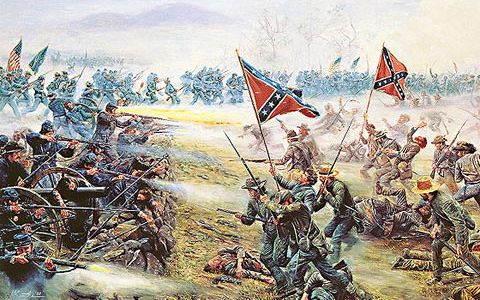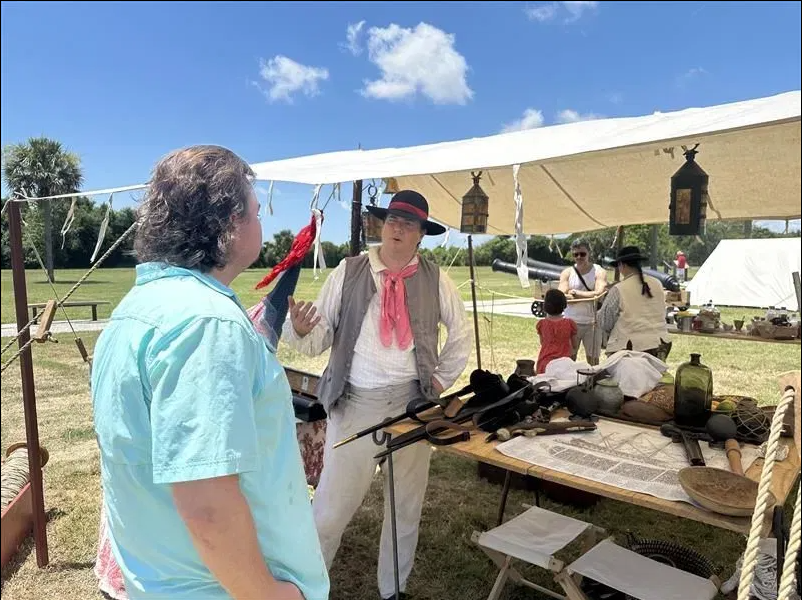As the 150th anniversary of the start of the Civil War approaches, most Americans say the war between the North and South is still relevant to American politics and public life today.
Civil War approaches, most Americans say the war between the North and South is still relevant to American politics and public life today.
More than half of Americans (56%) say the Civil War is still relevant, according to the latest national survey by the Pew Research Center for the People & the Press, conducted March 30-April 3 among 1,507 adults. Nearly four-in-ten (39%) say the Civil War is important historically but has little current relevance.
In a nation that has long endured deep racial divisions, the history of that era still elicits some strong reactions. Nearly half of the public (49%) says it is inappropriate for today’s public officials to praise the leaders of the Confederate states during the war; 36% say such statements are appropriate.
Nonetheless, a majority (58%) say they have no particular reaction to the Confederate flag, the symbol of the South. Among those who have a reaction to the flag, more than three times as many say they have a negative reaction as a positive reaction (30% to 9%).
There is no consensus among the public about the primary cause of the Civil War, but more (48%) say that the war was mainly about states’ rights than say it was mainly about slavery (38%). Another 9% volunteer that it was about both equally.
Young people are more likely than older Americans to say that the war’s main cause was states’ rights – 60% of those younger than 30 express this view, the highest percentage of any age group. Those 65 and older are the only age group in which more say that slavery, rather than states’ rights, was the main cause of the Civil War (by 50% to 34%). While 48% of whites view states’ rights was the war’s main cause, so too do 39% of African Americans.
Sense of Southern Identity
 On some, but not all, issues relating to the Civil War, the views of whites who identify as Southerners differ significantly from those who do not.
On some, but not all, issues relating to the Civil War, the views of whites who identify as Southerners differ significantly from those who do not.
About a quarter of all whites (24%) consider themselves Southerners; 75% do not.
Nearly half of self-described Southern whites (49%) see states’ rights as the war’s main cause; among whites who do not consider themselves Southerners, a comparable percentage (48%) also says states’ rights was the war’s main cause. However, self-described Southern whites are more likely than other whites to view praise by politicians for Confederate leaders as appropriate and to have a positive reaction to displays of the Confederate flag.
Less Positive View of Politicians Praising Confederates
 The public expresses a less positive view of politicians praising Confederate leaders than it did a decade ago. In a January 2001 Gallup survey, 50% said they thought it was appropriate for public officials to praise the leaders of the Confederate states in the Civil War; 40% said such praise was inappropriate.
The public expresses a less positive view of politicians praising Confederate leaders than it did a decade ago. In a January 2001 Gallup survey, 50% said they thought it was appropriate for public officials to praise the leaders of the Confederate states in the Civil War; 40% said such praise was inappropriate.
In the new survey, more think that politicians’ statements praising Confederate leaders are inappropriate rather than appropriate (by 49% to 36%).
Whites who consider themselves Southerners are the only group in which substantially more view public officials’ praise for Confederate leaders as appropriate rather than inappropriate (52% to 32%). A plurality of all whites (49%) – and a clear majority of African Americans (60%) – say it is inappropriate for public officials to praise Confederate leaders.
About six-in-ten (59%) among those with at least a college degree also say praising leaders of the former Confederate states is inappropriate, while 30% say they do not have a problem with that. Those with a high school diploma or less are divided (42% appropriate, 41% inappropriate).
Racial Differences in Reactions to Confederate Flag
 Only a small number of Americans say they display the Confederate flag, but that symbol of the Southern cause elicits more negative reactions from some groups – especially African Americans, Democrats and the highly educated. Nevertheless, most Americans say they do not react positively or negatively when they see the Confederate flag.
Only a small number of Americans say they display the Confederate flag, but that symbol of the Southern cause elicits more negative reactions from some groups – especially African Americans, Democrats and the highly educated. Nevertheless, most Americans say they do not react positively or negatively when they see the Confederate flag.
Fewer than one-in-ten (8%) say they display the Confederate flag in places such as their home or office, on their car or on their clothing; 91% say they do not. The number that displays the Confederate flag is just a small fraction of the 75% who say they display the American flag in their homes or offices, on their cars or their clothing.
Far more African Americans than whites have a negative reaction to the Confederate flag (41% to 29%). Still, about as many blacks have no reaction (45%) as a negative reaction to the Confederate flag. Among whites, 61% have no reaction.
Whites who consider themselves Southerners have a more positive reaction to the Confederate flag than do other whites: 22% say they react positively when they see the Confederate flag displayed, compared with 8% of all whites and just 4% of whites who do not consider themselves Southerners.
Nearly half of those with at least a college degree (46%) say they have a negative reaction to the display of the Confederate flag, compared with a third (33%) of those with some college experience and just 18% of those with a high school diploma or less.
There also are partisan differences in reactions to the flag: about twice as many Democrats (44%) as Republicans (21%) react negatively to displays of the Confederate flag. And Republicans are more likely than Democrats to have a positive reaction to the flag (15% vs. 7%).
About the Survey
The analysis in this report is based on telephone interviews conducted March 30-April 3, 2011 among a national sample of 1,507 adults 18 years of age or older living in the continental United States (1,001 respondents were interviewed on a landline telephone, and 506 were interviewed on a cell phone, including 215 who had no landline telephone). The survey was conducted by interviewers at Princeton Data Source under the direction of Princeton Survey Research Associates International. A combination of landline and cell phone random digit dial samples were used; both samples were provided by Survey Sampling International. Interviews were conducted in English. Respondents in the landline sample were selected by randomly asking for the youngest adult male or female who is now at home. Interviews in the cell sample were conducted with the person who answered the phone, if that person was an adult 18 years of age or older. For detailed information about our survey methodology, see http://www.people-press.org/methodology/
The combined landline and cell phone sample are weighted using an iterative technique that matches gender, age, education, race, Hispanic origin, region, and population density to parameters from the March 2010 Census Bureau’s Current Population Survey. The sample also is weighted to match current patterns of telephone status and relative usage of landline and cell phones (for those with both), based on extrapolations from the 2010 National Health Interview Survey. The weighting procedure also accounts for the fact that respondents with both landline and cell phones have a greater probability of being included in the combined sample and adjusts for household size within the landline sample. Sampling errors and statistical tests of significance take into account the effect of weighting. The following table shows the sample sizes and the error attributable to sampling that would be expected at the 95% level of confidence for different groups in the survey:

Sample sizes and sampling errors for other subgroups are available upon request.
In addition to sampling error, one should bear in mind that question wording and practical difficulties in conducting surveys can introduce error or bias into the findings of opinion polls.



